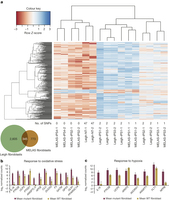J Neurooncol:重大突破!基因疗法可使复发性胶质母细胞瘤患者的存活期翻倍
2015-10-05 MedSci MedSci原创
重大突破!基因疗法可使复发性胶质母细胞瘤患者的存活期翻倍10月1日,来自圣安东尼奥德克萨斯大学卫生科学中心的癌症治疗和研究中心(CTCR)的研究人员表示,与目前的标准疗法相比,试验性基因疗法可使得复发性胶质母细胞瘤的存活率翻倍。胶质母细胞瘤是种具有侵袭性的脑部肿瘤,五年存活率约为33.3%。复发性胶质母细胞瘤患者通常仅有数周或数月的存活期。CTRC肿瘤专家Andrew J. Brenner博士,展
10月1日,来自圣安东尼奥德克萨斯大学卫生科学中心的癌症治疗和研究中心(CTCR)的研究人员表示,与目前的标准疗法相比,试验性基因疗法可使得复发性胶质母细胞瘤的存活率翻倍。胶质母细胞瘤是种具有侵袭性的脑部肿瘤,五年存活率约为33.3%。复发性胶质母细胞瘤患者通常仅有数周或数月的存活期。
CTRC肿瘤专家Andrew J. Brenner博士,展示了第二阶段临床研究的最终结果,对比了基因疗法(称为VB-111)持续性和间断性剂量与标准疗法(Avastin)的效果。接受VB-111治疗的患者平均可存活15个月,而仅接受Avastin治疗的患者其平均存活率为8个月。本研究中,CTCR及其他三个研究中心共纳入了62名复发性胶质母细胞瘤患者。
该研究的首席研究员Dr. Brenner于本周在奥地利维也纳举办的欧洲癌症大会上展示了此研究结果。 “这些是病情最为严重的患者,术后胶质母细胞瘤复发,其结果是预期寿命都很短,”Dr. Brenner 说道,“除了有益于整体存活率外,VB-111的应用对患者来说是安全的且患者的耐受性良好,说明VB-111无论是单一治疗还是联合Avastin治疗复发性胶质母细胞瘤均有效。”
通过阻断肿瘤新生血管的能力,VB-111可有效地“饿死”肿瘤,肿瘤分泌可激活VB-111药物的因子从而启动了此过程。“VB-111药物打败了癌症,” Dr. Brenner说道。
VB-111药物是每两个月静脉滴注一次,对患者及其家属来说用药 ,在美国及欧洲VB-111相当于孤儿药的地位。
VB-111最常见的副作用是发烧,给药后可持续一到两天,这是机体对药物的免疫反应,是药物发挥作用的重要环节。
提高患者的总体生存期具有显著地临床意义。Dr. Brenner表示, “与当前任何的基准相比VB-111的试验结果很有优势,或可改变复发性胶质母细胞瘤患者的治疗模式。”
“Dr. Brenner及其团队的此项研究工作在脑部肿瘤的治疗上取得了突破性的进展,” Ian Thompson Jr博士说道,“也特别感谢Dr. Brenner帮助领导了众多正在研发新一代癌症治疗方法的科学家及医生团队。”

VBL’s lead compound VB-111 is the first highly targeted anti-angiogenic agent for the specific inhibition of tumor vascular growth to use VTS™, for cancer therapy. VB-111 is an IV-administered anti-angiogenic agent for the treatment of solid tumor indications, with current clinical trials in rGBM, thyroid cancer and ovarian cancer.
VBL has obtained fast track designation for VB-111 in the United States for prolongation of survival in patients with glioblastoma that has recurred following a treatment with standard chemotherapy and radiation; we have also received orphan drug designation in both the United States and Europe.
VBL designed VB-111 to address oncology indications, specifically solid tumors, by selectively targeting the blood vessels required for tumor growth and inducing the programmed cell-death process, or apoptosis, of cells in those blood vessels. VB-111’s mechanism of action is independent of tumor-specific mutations, which we believe makes it less susceptible to resistance and, therefore, potentially applicable for a broader patient population than current therapies.
- Preclinical Insights: Preclinical pharmacological and toxicology studies on VB-111 have shown tissue specificity for the tumor tissue, no significant damage to normal non-cancerous tissues or to the normal blood vessels in the body, and a more than 90 percent reduction in metastatic lung cancer model with one injection, as well as similar efficacy in other tumor models.
- Phase I “all comers” Clinical Trial: We conducted our Phase 1 “all comers” clinical trial of VB-111 in the United States as an open-label, dose-escalating trial to assess the safety, pharmacokinetics and pharmacodynamics of VB-111 in 56 patients with advanced metastatic cancer. The trial was performed at multiple centers and was initiated as a single dose trial. A statistically significant improved overall survival in the VB-111 therapeutic dose cohort as compared to other cohorts was seen. In addition, there was a trend of improvement in the progression free survival rate in response to VB-111 at the therapeutic dose. Following prolonged stability, a partial response, or both, in several patients after treatment with a single dose, we enrolled patients into two additionaldose cohorts who received multiple therapeutic doses of VB-111 in two specific tumor types.
- Phase I/II and Phase II Clinical Trials – top-line interim results from our ongoing Phase 2 study of VB-111 in patients with recurrent glioblastoma (rGBM) demonstrated a statistically significant improvement in overall survival in patients treated with VB-111 followed by VB-111 in combination with bevacizumab (Avastin®) upon disease progression, compared to patients treated with VB-111 followed by bevacizumab alone upon further progression (p=0.05).
We are also conducting an exploratory Phase 2 clinical trial in the United States as an open-label, dose- escalating trial to assess the safety and efficacy of single or multiple doses of VB-111 in patients with advanced, recently progressive differentiated thyroid cancer that is unresponsive to radioactive iodine. Analysis performed in December 2014 showed that six patients (35%) in the therapeutic dose cohort (n=17) met the primary endpoint of 6-month progression-free survival using Response Evaluation Criteria in Solid Tumors (RECIST), compared to three patients (23%) in the low dose cohort (n=13). VB-111 was well-tolerated in both stages of this study, with no signs of clinically significant safety issues. The company will continue to follow the patients and shall provide a full Phase 2 report by the end of the first half of 2016.
On May 30, 2015 at the 2015 American Society of Clinical Oncology (ASCO) Annual Meeting, VBL Therapeutics presented positive interim results from an investigator-initiated, Phase 1/2a of VB-111 in Recurrent Platinum-Resistant Mullerian (Ovarian) Cancer. The data demonstrated promising evidence of clinical benefit in patients with recurrent platinum-resistant Müllerian cancer who received VB-111 in conjunction with weekly paclitaxel. The trial is conducted at Massachusetts General Hospital and Dana Farber Cancer Institute, Boston, MA under VBL’s IND.
- Phase III Clinical trial – VBL Therapeutics’ pivotal Phase 3 GLOBE trial of VB-111 in rGBM is ongoing under a special protocol assessment granted by the FDA.
Gruslova A, Cavazos DA, Miller JR, Breitbart E, Cohen YC, Bangio L, Yakov N, Soundararajan A, Floyd JR, Brenner AJ.VB-111: a novel anti-vascular therapeutic for glioblastoma multiforme. J Neurooncol. 2015 Sep;124(3):365-72.
本网站所有内容来源注明为“梅斯医学”或“MedSci原创”的文字、图片和音视频资料,版权均属于梅斯医学所有。非经授权,任何媒体、网站或个人不得转载,授权转载时须注明来源为“梅斯医学”。其它来源的文章系转载文章,或“梅斯号”自媒体发布的文章,仅系出于传递更多信息之目的,本站仅负责审核内容合规,其内容不代表本站立场,本站不负责内容的准确性和版权。如果存在侵权、或不希望被转载的媒体或个人可与我们联系,我们将立即进行删除处理。
在此留言














#胶质母细胞#
58
#母细胞瘤#
80
#Oncol#
61
#复发性#
0
#细胞瘤#
74
#复发性胶质母细胞瘤#
79
#存活期#
102